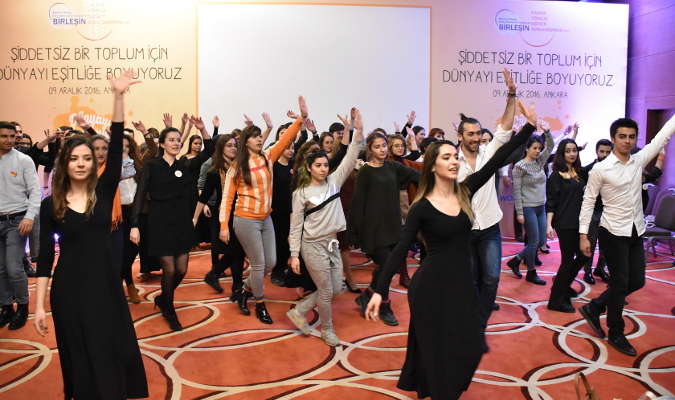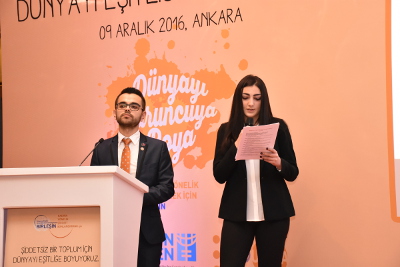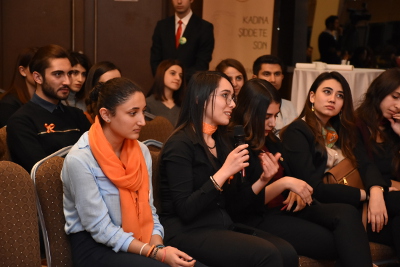Turkish youth call for an end to gender-based violence
As part of Turkey’s 16 Days of Activism campaign activities, more than 100 students from Ankara universities attend a youth summit and read out their manifesto, Coloring the World with Equality for a Society without Violence, and share their recommendations to end gender-based discrimination.
Date:

Depriving children of education is a form of violence, said Turkish university students in a manifesto issued after attending a UN workshop in Ankara, the country’s capital.
Noting that child marriages limit children’s access to education and fundamental rights and that disadvantaged groups are often subjected to violence and discrimination at work, the manifesto, Coloring the World with Equality for a Society without Violence, called for an end to gender-based violence. Manifesto headlines included: “I am beautiful with my differences. Do not stereotype me!” and “My body is mine! Sexual intercourse is only possible with mutual consent and will.”
The manifesto was issued after students attended a 19 November workshop at UN House in Ankara. It was then read at a youth summit organized by UN Women, UN Turkey and UNFPA on 9 December as part of Turkey’s 16 Days of Activism campaign activities. The more than 100 university students attending the youth summit made presentations about their awareness raising activities to end violence against women.

Students from Ankara, Atılım, Çankaya, Hacettepe and Middle East Technical Universities attended the 19 November workshop. They issued the Coloring the World with Equality for a Society without Violence manifesto after day-long discussions on ending gender-based discrimination and violence.
At the 9 December event, Ms. Fulya Vekiloğlu, UN Women Country Programme Director, noted that empowering young men and women as partners was important to achieve gender equality.
“We aim to build partnerships with young women and men to realize gender equality. These partnerships help us to struggle with stereotypes and prejudices and develop gender-sensitive politics. Gender equality is one of the sustainable development goals. You young men and women are important actors to reach these goals,” said Ms. Vekiloğlu.
Meltem Ağduk, Gender Programme Coordinator of UNFPA, talked about the role the younger generation can play to end violence against women and girls. Prof. Dr. Yıldız Ecevit, Head of Middle East Technical University’s Gender and Women’s Studies, gave a presentation about gender studies and the history of activism to fight gender-based discrimination. Dance students from Ankara University’s Modern Dance Department gave a dance show. Ms. Ezgi Koçak, a gender-based violence activist, shared her experiences with the students.

Mr. Michael Ingledow, Council of Europe Program Office Head, called on youth to support the Istanbul Convention, the Council of Europe’s Convention on preventing and combating violence against women and domestic violence.
“For the 22 countries which ratified the Convention, there is an obligation to adopt and implement comprehensive and coordinated policies and to involve all relevant groups, police, government, NGOs, civil society and national human rights organizations to fight violence against women,” said Mr. Ingledow. “You too have an important role to play in prevention domestic violence and violence against women.”
Ms. Zeliha Ünaldı, Gender Specialist in the Office of the UN Resident Coordinator in Turkey, closed the youth summit by reading students’ thoughts about a world without violence and gender based discrimination.
At the youth summit’s conclusion one student said students needed to reach younger people and lead by example to start ending gender-based violence: “Becoming a role model is important. As women we have to show that we can do everything.”